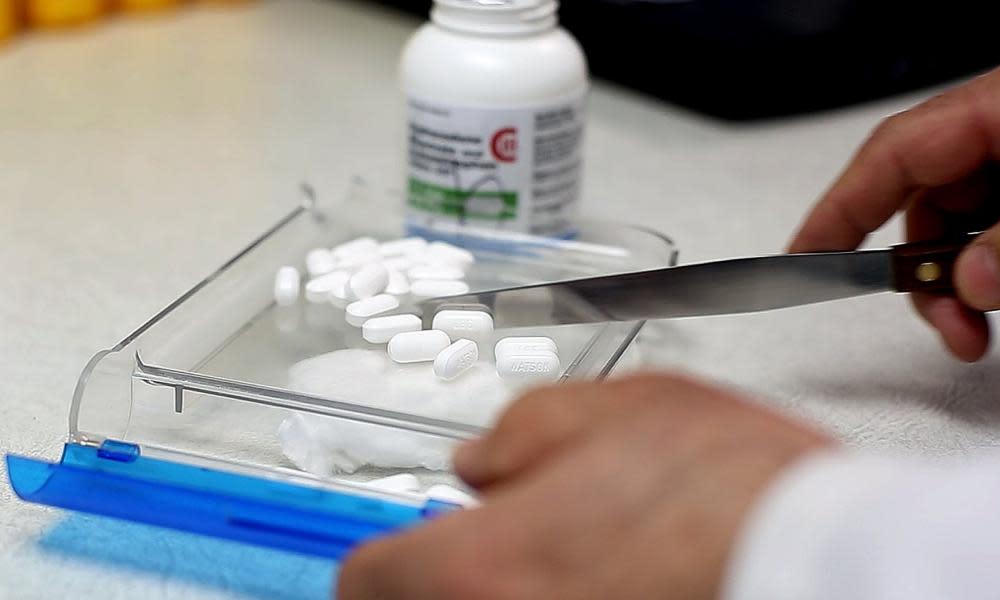'Well-oiled machine': how Brexit disruption could hit medicine supplies

Few of the recipients of the millions of prescriptions dispensed every day across Britain are likely to give much thought to the system that ensures that everything from painkillers to niche medicines are available. Beyond the pharmacist’s counter, however, lies a network spanning national borders andcontinents and involving multiple supply chains.
“It all works so smoothly because of the incentives and obligations that are in place,” said one industry insider. “What will be really interesting to see is what happens when it comes under pressure.”
At a very basic level, there are two kinds of drug: branded and generic. Household names such as Glaxosmithkline and Pfizer make their money from effectively inventing new medicines and receiving a patent on them for 20 or so years. Prices come down a lot when the patent expires and other manufacturers come in to produce copies. Eighty per cent of prescriptions written are for generics.
Crucial to both categories of drug are the active pharmaceutical ingredients (APIs). These are largely made in places such as India and China, so even if medications are manufactured here, the chances are that the APIs will have been brought in from abroad.
“Medicines coming from countries such as India and China can go via mainland Europe, and if that happens, they will typically come by ferry across the Channel. That could be an issue under Brexit,” said Warrick Smith, director general of the British Generic Manufacturers Association. “If they are coming directly from India and China and not via Europe, then there would be no disruption to supply.” He said about 50% of medicine came via Europe.
Drugs in the UK are now significantly cheaper than in other countries as competition from more generics has driven the price down. There are worries that if there is a shortage, suppliers will choose to sell in Germany or the US over the UK because they will make more money.
Branded medicines are repriced every few years following negotiations between the government and major manufacturers. One industry figure described it as a well-oiled machine balancing companies’ need for profit with the state’s desire for affordability.
Two categories of drug wholesalers come into play for most medicines: full line wholesalers, which effectively guarantee a full stock of a wide range of products and often deliver daily to pharmacists, and short line wholesalers, which specialise in high volumes of generic drugs, often at keener prices.
At street level, there is broadly a 50/50 split between the large chains such as Boots and independent pharmacies.
Like supermarket food, a “just in time” system applies to the supply and stocking of medicines. “That’s why we have real worries about the potential chaos at ports,” said Mark Burdon, a pharmacist in Newcastle. “The government keeps on talking about stockpiles of several months, but that involves potentially millions of items. On the one hand, it’s going to be a challenge to manage that quantity, and it’s also a lot of medicines to run through what is a very lean and efficient supply chain.”
Independent pharmacies of the type run by Burdon typically get multiple deliveries each day from several suppliers. “It’s based on quite thin margins, so if you dispense one pack of something, then you reorder another. You can imagine how the ripples could be felt from, say, any sort of problems at ports. A minor delay would really be felt down the line.”
Burdon is most worried about the supply of items such as anti-psychotic medications and anti-depressants. Unlike painkillers and anti-inflammatory drugs, these cannot often be easily substituted with a generic alternative.
Warrick Smith, of the BGMA, noted that the government was talking about expanding ferry capacity with different routes and giving priority lanes for medicines if needed. “The government has done a lot of preparation work for this and put in place a lot of measures to ensure the continued supply of high-quality medicines for the UK. The best way to ensure this, however, is to remain in the European regulatory system for medicines, and not to have issues at the border.”
Burdon has similar concerns. “I’m reminded these days of what they say about humanitarian crises. They arise if there are shortages of food, water and medicine. Disruption to any one of those things can very soon lead to crises.”

 Yahoo News
Yahoo News 
